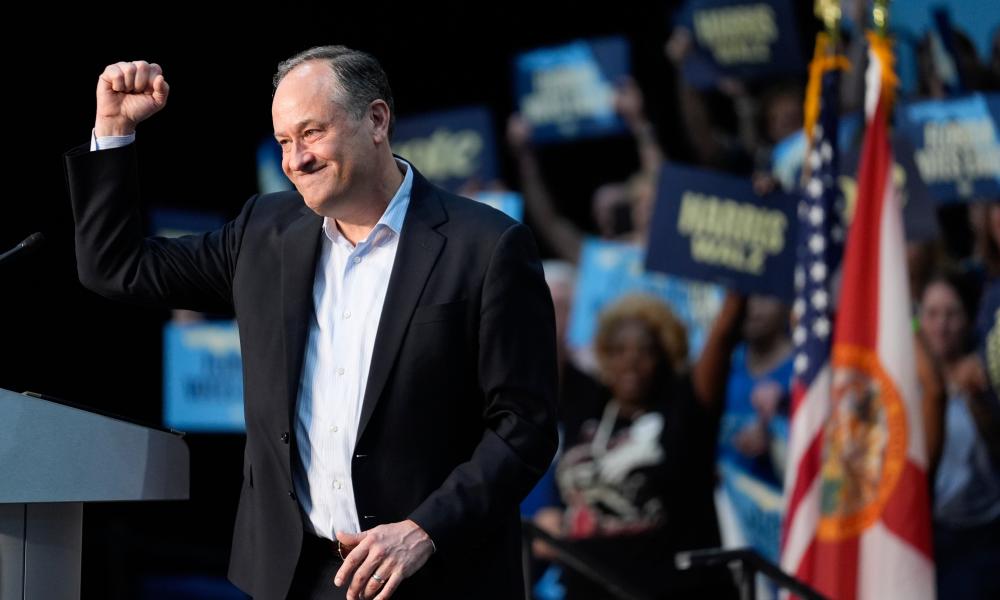In recent presidential elections, Florida has transitioned from being a quintessential swing state to a steadfastly Republican stronghold, with Donald Trump now dominating the political landscape. The state, once pivotal in deciding national outcomes—most notably the contentious 2000 election that resulted in George Bush’s presidency after a razor-thin margin of victory—is no longer viewed as a crucial battleground. With Trump confident in securing Florida’s 30 electoral votes, he has significantly diminished his campaign efforts in the state. Similarly, Vice President Kamala Harris has also little presence in Florida as both parties realign their strategies toward regions perceived as more competitive. This raises questions about the Democrats’ approach and the potential for revitalizing their voter base in a state that they once counted on for electoral success.
Amid this political landscape, Doug Emhoff, the husband of Vice President Harris, took the initiative to engage with Democratic voters in Florida, a move that surprised many given the general consensus about the state’s increased Republican leanings. Emhoff’s rally in Fort Lauderdale served as a symbolic gesture, aimed at invigorating the party’s base and instilling a sense of hope among supporters. Despite polling data indicating Trump enjoys a significant lead over Harris, Emhoff expressed an optimistic belief in the viability of winning Florida, particularly noting its importance in the tight race for the U.S. Senate seat currently held by Republican Rick Scott. His campaign materials emphasized not only the presidential race but also the significance of down-ballot candidates, suggesting a broader strategy aimed at Democratic resurgence in local offices.
One of the central themes of Emhoff’s rally was the contentious debate over women’s healthcare rights in Florida, which has become a polarizing issue with the potential amendment to overturn the state’s restrictive abortion laws. His remarks pointedly targeted Trump, labeling him as a destructive force against women’s rights, and he fervently supported Amendment 4, which aims to roll back the state’s six-week abortion ban. This controversy highlights the growing divide over reproductive rights in Florida and reflects a national conversation on the issue that could sway voters in favor of the Democrats. Emhoff’s passionate address about protecting women’s healthcare resonated with attendees, punctuating the rally with a commitment to safeguard reproductive freedoms and challenge Republican narratives.
Emhoff also addressed other pressing issues, including gun violence, the economy, and immigration, urging a stark contrast to the values and policies promoted by Republicans under Trump. His criticisms were sharp, labeling Trump’s conduct and political ideology as unfit for the presidency and warning of the dangers posed by what he termed Trump’s extremist influences. Emhoff’s comments served to unify Democrats around their shared goals, framing the upcoming election as not merely a contest of candidates, but a fundamental struggle over America’s democratic values and future direction. He implored the crowd to actively participate in the electoral process, asserting that they must be vigilant and engaged to prevent a “rerun” of Trump’s presidency.
In light of recent natural disasters impacting Florida, Emhoff’s engagement did not overlook the relevance of environmental concerns following hurricanes Helene and Milton. The fallout from these storms has highlighted tensions between the Democratic administration and the state’s Republican leadership, particularly Governor Ron DeSantis. Although the hurricanes were not central to Emhoff’s address, their backdrop represented ongoing struggles surrounding climate, safety, and state responses to disasters, points which the party has sought to leverage against Republican narratives. Emhoff’s remarks about these crises hinted at deeper systemic issues affecting Florida, especially in vulnerable communities disproportionately impacted by climate change.
Following the rally in Fort Lauderdale, Emhoff’s broader tour in Miami emphasized the urgency of appealing to the Hispanic community, a demographic both parties are vying for leading into the election. Local supporters expressed gratitude for Emhoff’s presence, interpreting it as a sign of continued Democratic investment in the state. While many believe the presidential race might be a lost cause in Florida, there is still hope for down-ballot victories that could rejuvenate the party’s standing. The grassroots enthusiasm displayed among local Democrats illustrates the ongoing desire for political representation and engagement, signaling that even amidst the challenges, there remains an active effort to mobilize support ahead of the critical election day which will decide not only the presidency but state and local races as well.

